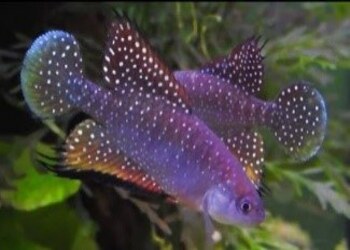International animal trafficking rings often cash in on global demand for smaller, lesser-known species, as shown by the dismantling of a global smuggling ring that poached killifish from Brazil and other countries.
In late April, the US Fish and Wildlife Service and Brazilian police seized hundreds of endangered live killifish after carrying out searches in the state of Maryland, according to the US embassy in Brazil. Raids were also carried out in the state of Iowa and the city of Los Angeles.
According to the Globo, police found some 200 tanks of killifish along with hundreds of eggs inside a Maryland home.
SEE ALSO: Police in Brazil Net Mass Seizure of Ornamental Fish
This was part of a transnational investigation carried out in Brazil, the United States and Europe, that identified a global network of over 80 suspects from 24 countries dedicated to trafficking endangered species of killifish via online platforms. Those involved were connected through wildlife clubs and social media groups, Brazilian police revealed.
Killifish can be found on every continent, with some 1,270 recognized species worldwide. These traders illegally collect threatened various species of these fish from national parks and protected areas in the United States, South America, Africa and Europe. The fish are then sold via social media and other online platforms, before being smuggled onward via international mail, according to officials.
And social media has been used to facilitate smooth deliveries, a trend echoed in the trafficking of other exotic species across Brazil.
InSight Crime Analysis
Brazil’s lucrative trade in ornamental fish has long fed international markets. But killifish trafficking out of the South American country shows that even lower-priced species have caught the eyes of smugglers.
Killifish are known for their ability to adapt to extreme conditions. But a number of species face an increased risk of extinction, heightened by the fact that they are incredibly difficult to breed.
As a result, prized species of killifish are not commonly found in pet stores and are poached to feed niche markets for hobbyists and researchers. When they are sold legally, individuals sell for between $5 to $22 in pet stores in the United States.
SEE ALSO: Social Media Used to Sell Exotic Animals in Brazil
Protected species of South American killifish, known locally as “rivulids,” are taken from their habitats in Brazil. Multiple aquariums containing hundreds of fish are typically found in the homes of those involved in smuggling endangered specimens abroad, with eggs packaged for international shipment.
Mail orders are sent out from Brazil frequently, to the likes of China, Russia, Argentina, Germany and the United Kingdom, among others. Killifish eggs can also withstand long periods of dehydration, explaining why this method continues to work to the advantage of smugglers, who include false sender data inside clandestine parcels.
In 2019, Brazilian police revealed agents working for the nation’s environmental agency (Instituto Brasileiro do Meio Ambiente e dos Recursos Naturais Renováveis — IBAMA) seized 32 packages, containing killifish eggs without proper export licenses at Guarulhos Airport in the state of São Paulo, between January 2018 and April 2019.
And in early 2019, a biologist working at municipal parks in Brazil’s city of Belo Horizonte, located in the eastern state of Minas Gerais, was dismissed after he was suspected of illegally sending killifish eggs abroad.

